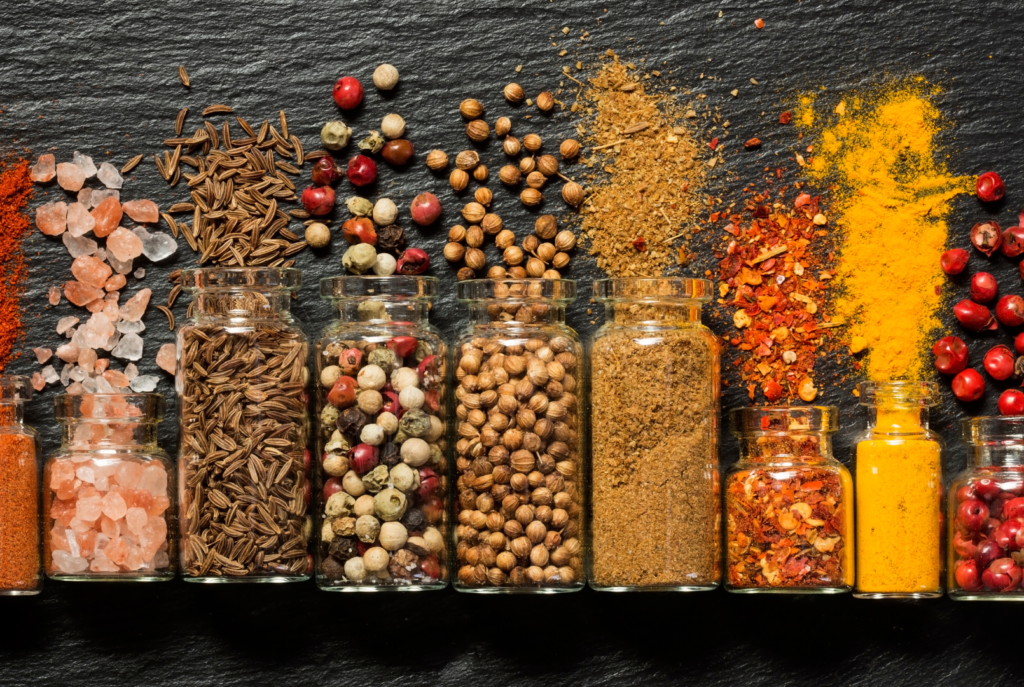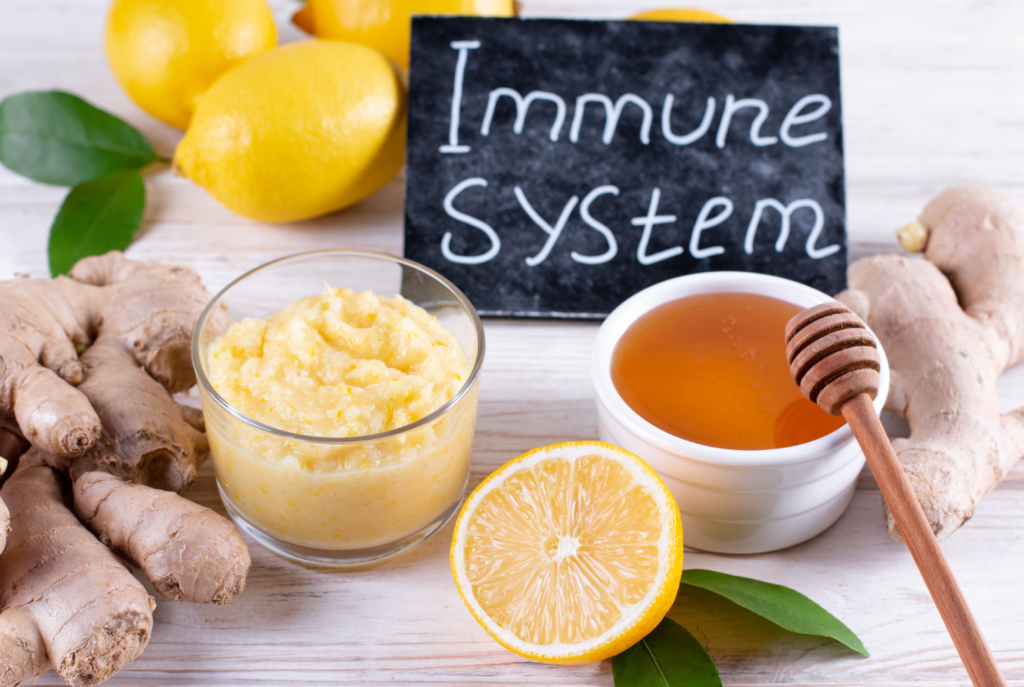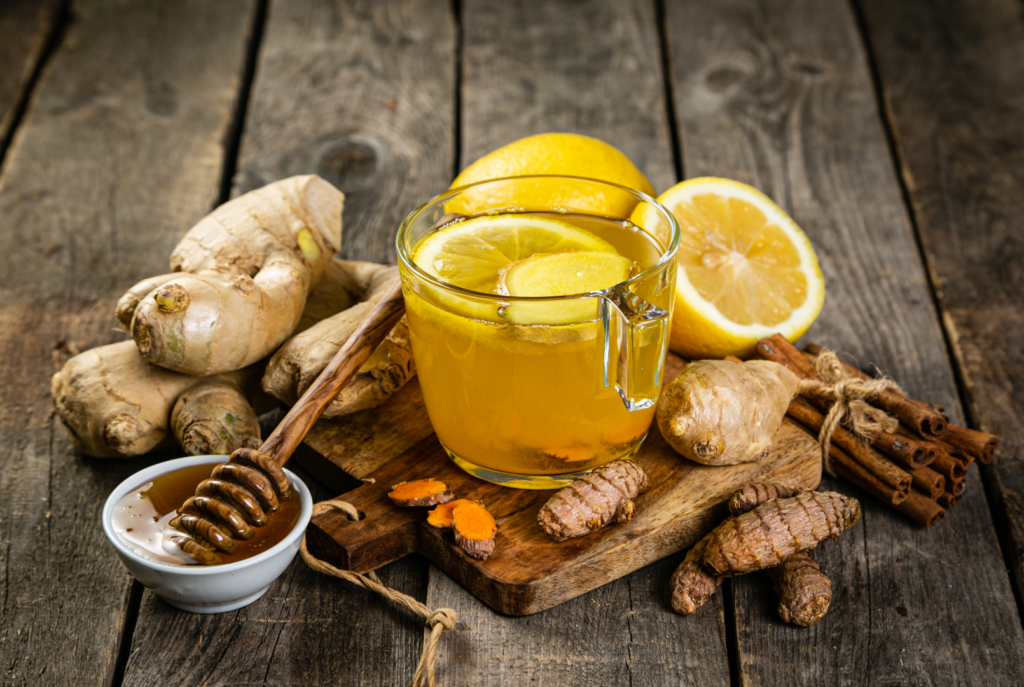

Table of Contents

Indian cuisine is celebrated not just for its rich and diverse flavors but also for the array of spices that form its backbone. These spices, ranging from the golden hue of turmeric to the warmth of cumin, have been revered for centuries for their culinary and medicinal properties. In this blog, we’ll delve deeper into the benefits of Indian spices and why they are essential in promoting better health and overall well-being.
The Rich Tradition of Indian Spices

The significance of spices in Indian culture cannot be overstated. Historically, spices have played a vital role not only in flavoring food but also in traditional medicine, particularly Ayurveda. This ancient system of medicine emphasizes the balance of body, mind, and spirit, often utilizing spices as natural remedies to promote health.
For example, turmeric, often dubbed the “golden spice,” has been a staple in Indian households for centuries. Its use is not only culinary; it is commonly found in Ayurvedic treatments aimed at reducing inflammation, aiding digestion, and improving skin health. Similarly, spices like cumin and coriander have roots in ancient healing practices, where they were valued for their digestive properties and ability to combat illnesses.
Today, as global interest in holistic wellness and natural remedies continues to rise, the health benefits of Indian spices are being recognized worldwide. Research has increasingly highlighted the role of these spices in preventing chronic diseases, boosting immunity, and promoting overall health.
Why Should We Include Spices in Our Diet?
- Boost Immunity
Indian spices are rich in antioxidants and possess strong anti-inflammatory properties, which can significantly enhance the immune system. Turmeric is particularly notable due to its active compound, curcumin, which has been extensively studied for its immune-boosting capabilities. Regular consumption of turmeric can help reduce inflammation in the body, thereby protecting against various diseases.
Black pepper is another spice that complements turmeric beautifully; it contains piperine, which enhances the absorption of curcumin by up to 2000%. This combination makes for a powerful ally in boosting immune response and fighting infections.

- Support Digestive Health
Digestive issues are a common concern for many, and Indian spices can play a significant role in alleviating these problems. Cumin and coriander are well-known for their ability to stimulate the secretion of digestive enzymes, which can help alleviate symptoms of indigestion, bloating, and gas.

- Enhance Metabolism and Aid Weight Loss
Spices like chili peppers are packed with capsaicin, a compound that can boost metabolism and promote fat burning. Studies have shown that capsaicin can increase the metabolic rate, leading to more calories burned throughout the day. Incorporating chili peppers into your diet can help manage weight and support weight loss goals.

- Regulate Blood Sugar Levels
With the rising prevalence of diabetes, incorporating spices that help regulate blood sugar levels is essential. Fenugreek seeds are particularly effective in improving insulin sensitivity and controlling glucose levels. Studies have shown that fenugreek can significantly lower blood sugar levels in individuals with diabetes.
Cinnamon is another spice that has garnered attention for its ability to regulate blood sugar. It works by increasing insulin sensitivity and slowing down the digestion of carbohydrates, leading to better blood sugar control.

- Promote Heart Health
Heart health is crucial for overall well-being, and several Indian spices can contribute positively. Garlic, commonly used in Indian cooking, is known to reduce cholesterol levels and lower blood pressure, making it a heart-healthy addition to your diet.
Turmeric also plays a role in promoting heart health due to its anti-inflammatory properties, which protect arteries from damage and reduce the risk of heart disease. Incorporating these spices into your meals can lead to a healthier heart.

- Provide Antioxidants
Antioxidants are vital for combating oxidative stress, which can lead to chronic diseases like cancer, heart disease, and neurodegenerative disorders. Many Indian spices, such as cloves, cinnamon, and cardamom, are rich in antioxidants that help neutralize harmful free radicals in the body.
For instance, cloves have one of the highest antioxidant levels among spices and can help improve overall health by reducing inflammation and oxidative stress.

Key Indian Spices and Their Health Benefits
- Turmeric
Known for its vibrant color and flavor, turmeric is a powerhouse of health benefits. Its primary active ingredient, curcumin, is well-known for its powerful anti-inflammatory and antioxidant effects. Turmeric can be added to various dishes, including curries, soups, rice, and even smoothies. - Cumin
Cumin seeds are not only flavorful but also beneficial for digestion. They can help reduce bloating and improve the absorption of nutrients. Cumin is a staple in Indian curries and lentil dishes and is often used in spice blends like garam masala. - Coriander
Coriander is known for its detoxifying properties and ability to aid digestion. It is rich in dietary fiber, iron, and vitamins A, C, and K. Coriander seeds are often used in spice blends, while fresh coriander leaves add a fresh touch to salads and garnishes. - Ginger
Ginger is a versatile spice that can be used to treat various ailments, including nausea, digestive disorders, and colds. Its anti-inflammatory properties make it beneficial for respiratory health. Ginger can be added to teas, curries, marinades, and desserts. - Black Pepper
Known as the “king of spices,” black pepper enhances the absorption of nutrients, particularly curcumin in turmeric. It also aids digestion and has antimicrobial properties, making it a valuable addition to any savory dish. - Cardamom
Cardamom not only adds flavor but also has digestive benefits and antioxidant properties. It can help lower blood pressure and improve overall heart health. Cardamom is used in both sweet and savory dishes, including teas, desserts, and biryanis. - Cinnamon
Cinnamon is a powerful antioxidant that helps regulate blood sugar levels and has anti-inflammatory properties. It can be added to both sweet and savory dishes, enhancing the flavor while providing health benefits.

Get an Extra 10% Off – Fill out the Form Below!
How to Incorporate Indian Spices into Your Diet

Incorporating Indian spices into your meals is easier than you might think! Here are a few ideas to help you begin:
- Start with Simple Spice Blends: Creating your own spice blends can be a fun and flavorful way to introduce Indian spices into your cooking. Mix basic spices like cumin, coriander, turmeric, and chili powder to create your own masala (spice blend). This blend can be used in various dishes, from vegetables to meats.
- Use Spices in Dressings and Marinades: Spices can elevate the flavor of dressings and marinades. Try adding mustard seeds, turmeric, or garlic to your salad dressings or marinades for extra flavor and health benefits. This not only enhances the taste but also boosts the nutritional profile of your meals.
- Spice Up Your Tea: Incorporating spices into your daily tea can be a refreshing way to enjoy their benefits. Adding ginger, cardamom, or cinnamon to your tea can provide a warm, aromatic experience while promoting health.
- Experiment with Spices in Everyday Cooking: Don’t be afraid to experiment! Use spices in non-traditional ways, such as adding a pinch of turmeric to your scrambled eggs or using cumin in your roasted vegetables. The possibilities are endless, and you’ll discover new flavor profiles along the way.

Dietitian’s Desk
Indian spices are more than just flavor enhancers; they are a treasure trove of health benefits. By incorporating a variety of spices into your meals, you can enjoy their healing properties while savoring delicious flavors. From the anti-inflammatory power of turmeric to the digestive benefits of cumin and the metabolic boost from chili peppers, Indian spices have something to offer everyone.
Dt. Anup Agharwal emphasizes the importance of including Indian spices in our diets, stating that their medicinal properties can significantly contribute to our overall health. He encourages people to explore the various ways to incorporate these spices into everyday meals, as doing so not only enhances flavor but also provides substantial health benefits.
FAQs
What are the health benefits of turmeric?
Turmeric is known for its anti-inflammatory and antioxidant properties, making it beneficial for joint pain, digestion, and immune health.
How can I use cumin in my cooking?
Cumin can be added to curries, lentil dishes, or used to make spice blends like garam masala.
How can I effectively include ginger in my diet?
Ginger can be used in teas, curries, marinades, or added to smoothies for a refreshing kick.
Can spices really boost my metabolism?
Yes, spices like chili peppers and ginger have compounds that can increase metabolic rate and aid in weight management.
Are there any spices that help regulate blood sugar?
Fenugreek, cinnamon, and turmeric have shown potential in regulating blood sugar levels and improving insulin sensitivity.
How can I make a spice blend at home?
Mix equal parts of cumin, coriander, turmeric, and chili powder to create a versatile masala that can be used in various dishes.
Is it safe to consume spices daily?
Yes, in moderate amounts, spices are safe for daily consumption and can provide numerous health benefits.
Do spices have any side effects?
Generally, spices are safe, but excessive consumption may lead to digestive issues or allergic reactions in some individuals.
How can I spice up my tea?
Add ginger, cardamom, or cinnamon to your tea for an aromatic and flavorful boost.
What is the role of black pepper in cooking?
Black pepper enhances flavor and helps improve nutrient absorption, especially of curcumin in turmeric.

🎯 10+ years of Experience
🎓 10k+ Trained ( 📍 Jaipur )
💪 Helping change people’s lives
🌿 Most trusted lifestyle counselor
